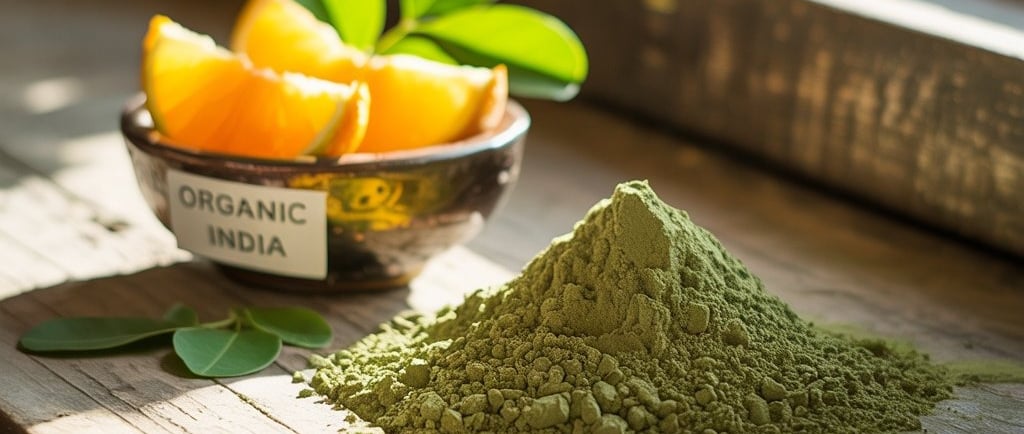Moringa Powder Guide: Uses & Benefits 2025
Discover the complete guide to moringa powder, including its uses, health benefits, and potential side effects. Learn how moringa can enhance your wellness in 2025. "moringa powder guide"
7/16/20254 min read


Introduction to Moringa Powder
Moringa powder is derived from the leaves of the Moringa oleifera tree, which is native to parts of Africa and Asia. Often referred to as the "miracle tree," Moringa has gained significant attention in health and wellness circles due to its impressive nutritional profile and health benefits. The plant thrives in various soil conditions and demonstrates remarkable resilience to drought, making it a valuable resource for many communities.
The process of producing moringa powder begins with the harvesting of mature moringa leaves. These leaves are typically collected and carefully dried to preserve their nutrient content. Once dried, the leaves are ground into a fine powder, resulting in a green, vibrant substance packed with vitamins, minerals, and antioxidants. This conversion process ensures the retention of key compounds such as vitamins A, C, and E, calcium, potassium, and iron. The nutrient density found in moringa powder has sparked interest among nutritionists and health enthusiasts alike.
Over the years, the popularity of moringa powder has surged, with many adopting it as a dietary supplement or an ingredient in various recipes. Its versatile nature allows it to be easily incorporated into smoothies, soups, and salads, providing an additional boost of nutrients. Moreover, as consumers become more aware of the potential health benefits associated with moringa, such as improved digestion, enhanced energy levels, and better overall wellness, the demand for this superfood continues to grow.
This introductory overview highlights not only the origins and production of moringa powder but also its rising significance in the realm of health and nutrition. With many individuals seeking natural supplements to support their health, moringa powder stands out as a potent option worth exploring.
Key Uses of Moringa Powder
Moringa powder, derived from the leaves of the Moringa oleifera tree, has gained recognition for its diverse culinary and health applications. This superfood is celebrated for its high nutrient density, encompassing vitamins, minerals, and antioxidants, making it a valuable addition to various diets. One of the principal uses of moringa powder is as a dietary supplement, where it can seamlessly integrate into smoothies, soups, teas, and salads, enhancing nutritional intake without overwhelming flavors. Individuals looking to boost their protein, iron, and calcium intake can easily incorporate this powder into their daily meals.
Moreover, moringa powder is utilized in traditional medicine practices across various cultures, praised for its potential health benefits, including anti-inflammatory properties and the ability to support digestive health. In Ayurvedic traditions, for instance, moringa is employed to stimulate metabolism and improve energy levels, highlighting its significance in holistic wellness approaches. As more people gravitate toward natural alternatives for health management, moringa powder stands out as a resourceful option for those seeking to enhance their nutritional profile.
Beyond its health benefits, moringa powder can inspire creativity in the kitchen. Innovative recipes that include this nutrient-rich powder can range from breakfast bowls topped with yogurt and fruit to savory dishes like moringa-infused pesto or energy bars. As culinary exploration continues to evolve, incorporating moringa powder into everyday meals presents an opportunity for individuals to not only enjoy its health benefits but also to creatively diversify their diet. Thus, whether consumed as a dietary supplement or utilized in cooking, moringa powder proves to be a versatile ingredient that caters to various dietary preferences and health goals.
Health Benefits of Moringa Powder
Moringa powder, derived from the leaves of the Moringa oleifera tree, has garnered attention in recent years for its impressive nutritional profile and potential health benefits. Rich in essential vitamins and minerals, it is particularly high in vitamin C, vitamin A, calcium, potassium, and iron, making it a valuable addition to a balanced diet. Furthermore, moringa powder is packed with antioxidants like quercetin and chlorogenic acid, which contribute to its health-boosting properties.
One notable benefit of moringa powder is its anti-inflammatory properties. Chronic inflammation is linked to various health issues, including heart disease and diabetes. Studies have shown that compounds in moringa can help reduce inflammatory markers in the body, providing support in managing these conditions. This aspect alone makes moringa a potential natural remedy for those seeking to enhance their overall wellbeing.
Additionally, moringa powder is known to improve digestion. It offers a significant amount of dietary fiber, which aids in maintaining a healthy digestive system and preventing constipation. Anecdotal evidence suggests that incorporating moringa into meals may enhance gut health and promote regular bowel movements.
In terms of energy levels, many users of moringa powder report feeling more energized after including it in their diet. This energy boost can be attributed to its rich nutrient content, providing the body with essential nutrients required for optimal functioning. For those experiencing fatigue or low energy, moringa powder may serve as a natural alternative to energy supplements.
Moreover, moringa's potential role in supporting immune function is noteworthy. The high levels of vitamins and antioxidants help the body combat oxidative stress and may bolster the immune system's resilience against infections. Lastly, research indicates that moringa may assist in managing blood sugar levels, an invaluable benefit for individuals with diabetes or at risk of developing the condition.
Potential Side Effects and Precautions
Moringa powder, derived from the leaves of the Moringa oleifera tree, is celebrated for its nutritional benefits and potential medicinal properties. However, like any supplement, it is crucial to consider its potential side effects and necessary precautions prior to use. One of the primary concerns is the appropriate dosage. While moringa is generally considered safe for most individuals, excessive consumption can lead to adverse reactions such as gastrointestinal discomfort, including nausea, diarrhea, and indigestion.
It is advisable for first-time users to start with lower doses—typically around one teaspoon a day—and gradually increase as their body adjusts. For adults, a common recommendation is to limit intake to 2-3 teaspoons daily, though specific dosages may vary based on individual health needs. Pregnant and breastfeeding women should exercise caution and ideally avoid moringa powder, as its effects on fetal development and lactation are not well-studied. Furthermore, those with pre-existing health conditions, particularly those involving the liver or kidneys, should consult a healthcare professional before incorporating this supplement into their regimen.
Additionally, moringa may interact with certain medications, notably anticoagulants and blood pressure drugs. Therefore, individuals taking such prescriptions must seek medical advice to avoid potential complications. Allergic reactions, although rare, do occur; signs may include rashes, itching, or swelling. Those experiencing these symptoms should discontinue use and consult a medical professional. Ultimately, understanding the potential side effects and adhering to recommended precautions can enhance the safe incorporation of moringa powder into one’s diet while minimizing risks.
Wellness
Experience vitality with our natural herbal solutions—crafted to boost immunity, detoxify, and energize. Pure, plant-based wellness for everyday health, rooted in Ayurvedic tradition.
Contact us
support@mleaf.co.in
+91-9911382286
© 2025. All rights reserved.
